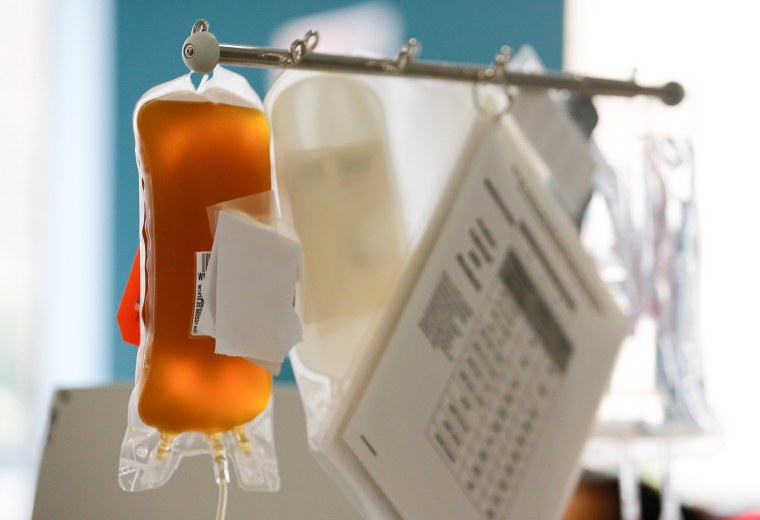Robust scientific studies on convalescent plasma, a potentially promising COVID-19 treatment, have gotten off to a slow start in the U.S., in part because some researchers were more focused on enrolling their sickest patients in other trials, including some for hydroxychloroquine.
"You always have that hindsight and say, oh man, we should have put our efforts into something else," said Dr. Todd Rice, an associate professor of medicine at Vanderbilt University Medical Center.
Full coverage of the coronavirus outbreak
Early on in the pandemic, Vanderbilt was involved in multiple clinical trials, including those on remdesivir and hydroxychloroquine. Even though the hospital system had also developed a randomized, placebo-controlled trial for convalescent plasma, Rice said, the other trials took priority.
While remdesivir was found to be beneficial to patients with COVID-19, the disease caused by the coronavirus, a number of large clinical trials on hydroxychloroquine ultimately failed to show any benefit.
Convalescent plasma comes from patients who have recovered from the coronavirus. Plasma is the part of blood that's left over when red and white blood cells are removed, leaving behind a yellowish, watery substance rich in proteins and antibodies. It's those antibodies that help the immune system fight off viruses. The idea is that giving a sick person an infusion of COVID-19 antibodies would give the patient's immune system a much-needed boost in fighting off the virus.
In the past week, the Trump administration has stepped up its call for people who have recovered from the illness to donate plasma. It has also pumped millions of dollars into an expanded access program run by the Mayo Clinic, which helps doctors quickly get their patients plasma infusions. At least 53,000 COVID-19 patients across the U.S. have participated.
But because everyone gets the real plasma in the program, there's no way to evaluate how well the infusion actually works. That would be done by comparing the treatment to a placebo, or control, group.
And it's why the Vanderbilt team declined to participate.
"It was really important to us to get randomized placebo-controlled data so that we could truly understand more about the efficacy and the safety of convalescent plasma in this patient population," said an investigator in the plasma study, Dr. Allison Wheeler, an assistant professor in the department of pathology, microbiology and immunology at Vanderbilt.
Download the NBC News app for full coverage of the coronavirus outbreak
Studies of convalescent plasma during the pandemic have shown it's safe. But despite anecdotal evidence, no research has proven it's effective against the coronavirus. Many patients who've received it have also had other medications, making it difficult to determine what therapy, if any, helped.
"It is unfortunate. We're here in August, and we don't have a rigorous response" to whether convalescent plasma works, Dr. Francis Collins, the director of the National Institutes of Health, said at a news briefing Tuesday.
In the same call with reporters, the nation's top infectious disease expert, Dr. Anthony Fauci, underscored the importance of a placebo-controlled, randomized trial for the plasma.
"If that had been done, we would've had the answer to that right now," said Fauci, director of the National Institute of Allergy and Infectious Diseases.
The trials have had a slow start, but they are, indeed, now underway.
Vanderbilt's trial has enrolled about 50 patients hospitalized with COVID-19. Half receive plasma from former COVID-19 patients, and half receive a placebo — in this case, a saline solution containing vitamins.
Rice said the goal is to recruit about 500 patients, but the team will take a preliminary look at the first 100 participants to see how it's working.
One of the biggest plasma research sites, Johns Hopkins Medicine, has ambitious plans to recruit more than 1,000 volunteers nationwide to receive plasma or a placebo. The research will focus on outpatients, designed to learn whether convalescent plasma can do one of two things: prevent the illness or keep infected people well enough to stay out of the hospital.
"I am very optimistic that this is going to work, but the only way we're going to find out is by doing a very careful clinical trial," said a lead investigator of the studies, Dr. Shmuel Shoham, an associate professor of medicine in Johns Hopkins' infectious disease division.
Shoham said he hopes to have preliminary results by mid-September to mid-October, but he said, "The truth is it all depends on whether people will step up to be part of the study."
Just 50 patients have signed up, although more are expected.
Baylor College of Medicine in Houston will participate in the Hopkins trial, and it is expected to start recruiting patients within the next week.
Trying convalescent plasma "seemed like a very reasonable thing to do," said Dr. Ashok Balasubramanyam, vice president for academic integration and senior associate dean for academic affairs at Baylor College of Medicine. "It has worked in many other instances, such as Ebola."
"It's a bit of a pity that the indiscriminate use of the plasma began five months before the randomized studies started, but, you know, better late than never," Balasubramanyam said.
Follow NBC HEALTH on Twitter & Facebook.


